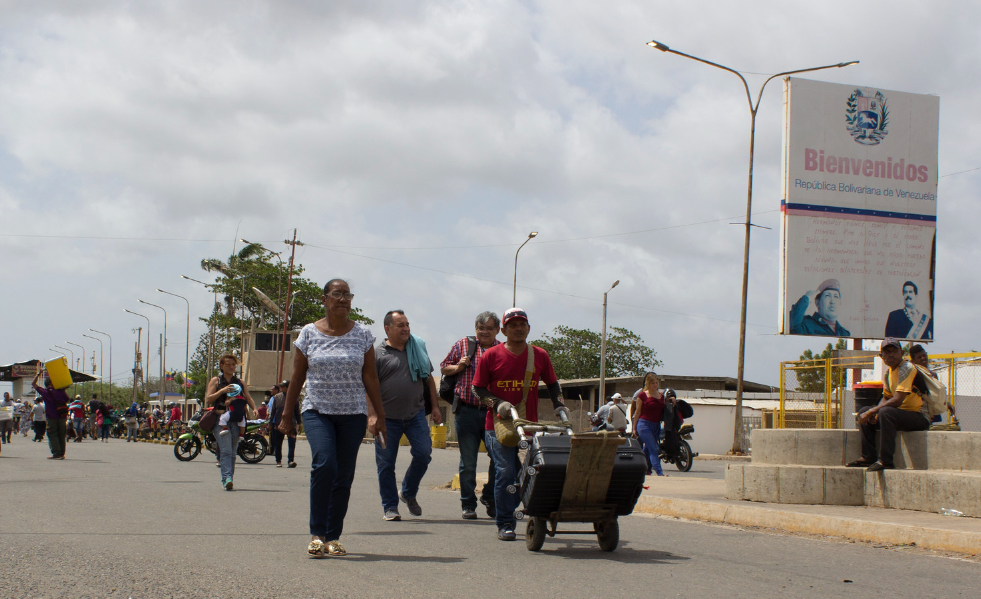In Venezuela, for several years, Chavismo had managed to remove the immigration issue from the political debate. In the 2024 presidential elections, however, it has become a relevant issue and possibly one of the main factors, from the people’s perspective, that play against Nicolás Maduro’s permanence in power for another six years.
Earlier this June, the R4V platform, which brings together the efforts of the UN Refugee Agency (UNHCR) and the International Organization for Migration (IOM) to address the effects of this exodus to neighboring countries, reported that 7.7 million Venezuelans have left the country since 2015.
This mass exit coincides with the term in power of Maduro, who has held the presidency of Venezuela since December 2012 and who, in an electoral campaign where he uses state resources and has been prevented from observing the European Union (EU), is seeking reelection to remain in office until 2030.
Beyond the fact that migration, as a social phenomenon and in this case, a massive one, is multi-causal, among Venezuelans the perception prevails that “people started to leave” during Maduro’s years in power.
The ruler inherited a crisis in gestation, no doubt, but the inertia that characterized his first years, which prevented him from promptly breaking with “the legacy” of his political father, Hugo Chávez, led the country to a complex humanitarian crisis that exploded precisely around 2015 with a generalized shortage of food and medicines together with macroeconomic imbalances similar to those recorded by countries after a war or natural disaster.
For the Chavismo in power, as the dictatorship in Cuba has long done, massive emigration was interpreted as an escape valve. With millions of people less inside the country, there would be more room for maneuvering in the face of the major crisis that ended up affecting all the chinks in Venezuelan social life.
The official strategy, in general, was to evade the issue and deny any responsibility. It looked the other way in the face of a massive process: in less than a decade, a quarter of the population literally fled Venezuela, in most cases with the little they could carry on their shoulders or backs.
In terms of narrative, as recently commented by Venezuelan journalist Jeanfreddy Gutierrez, based in Bogota, there were several stages. Chavismo first said that “nobody had migrated”, and later spoke of “actors” posing as migrants, especially when the harsh testimonies from the passage through the Darien jungle abounded.
On other occasions the Maduro government described them as “sifrinos” (upper-middle class and ostentatious), or it was said that in reality the migrants “were the children of returning Europeans and Colombians”.
The harsh testimonies, in most cases spontaneous, of the migratory mourning that Venezuela is going through became a central issue in the electoral campaign, which was quickly capitalized by the pro-democracy opposition actors.
This electoral agenda, crossed by the migratory mourning and in which in many cases chavismo is reactive rather than proactive, has forced the government of Nicolás Maduro to turn its face to society and offer some kind of response. On June 17, he announced the creation of the Vice-Ministry of Attention to Venezuelan Migration, attached to the Ministry of Foreign Affairs.
Given the opposition duo of María Corina Machado, the conservative leader but prevented by an administrative decision from participating as a candidate, and the legally registered candidate, former ambassador Edmundo González Urrutia, the immigration issue is almost always at the center of every political event in Venezuela these days.
Machado has led countless political events in remote areas of the country, intermediate populations where the effect of migration has been experienced more harshly. Older men, women, or even children and teenagers spontaneously approach her and comment, either to the opposition leader or even taking the microphone at a rally, the pain they feel for their relatives who are out of the country.
Testimonies of the teenager who has lived half of his life with his mother in another country to support him and his grandmother; the elderly and sick man who begs to have life to see the return of his several children, all migrants; or the woman who returned to Venezuela without seeing her mother alive and says: “I could barely get there to bury her”.A diversity of messages of this tenor have been present in the events of the democratic alternative that has in Machado a figure that energizes and mobilizes.
Men spontaneously put their small children in her arms and ask Machado to change things so that their children do not leave, or mothers break down in tears asking for family reunification. The migratory mourning has crossed the campaign and, although in their testimonies no one expressly mentions the Maduro regime, they all agree on the need for a political change to prevent the massive outflow of Venezuelans from continuing.
A recent survey by the public opinion firm Delphos showed that 25% of those consulted had plans to emigrate, but if there is no political change this year in Venezuela, in the July 28 elections, 45% of them said they will definitely become migrants.
Regarding the return to the country, this is an issue on which the official discourse insists. A survey by the U.S. agency Bloomberg, last February, showed that an economic improvement in the country but with Maduro extending his mandate was not enough reason to return. 65% said that an eventual return to Venezuela was primarily linked to a democratic political change.
This last figure demolishes the central axis of what chavismo announces as public policy. The focus given to massive migration, from the power, is the return to the country. And it is not a coincidence that, after so many years of ignoring or evading the migration issue, the creation of a public agency for this problem is announced precisely when harsh testimonies have gone viral during the campaign from the opposition side.
“Let’s work for the thousands we have on the lists [to be repatriated]. Many want to return, but they don’t have the resources. […] They went from working with dignity here to washing toilets abroad,” Maduro said in his message on June 17, which was quickly questioned.
An official announcement was made to attend to Venezuelan migration, but the same message insists on stigmatizing and disqualifying migrants: “They are labeled as deceived [by capitalism] and money-launderers”, says Gutiérrez, who follows the issue of the massive presence of Venezuelans in Colombia.
*Translated from Spanish by Micaela Machado Rodrigues













